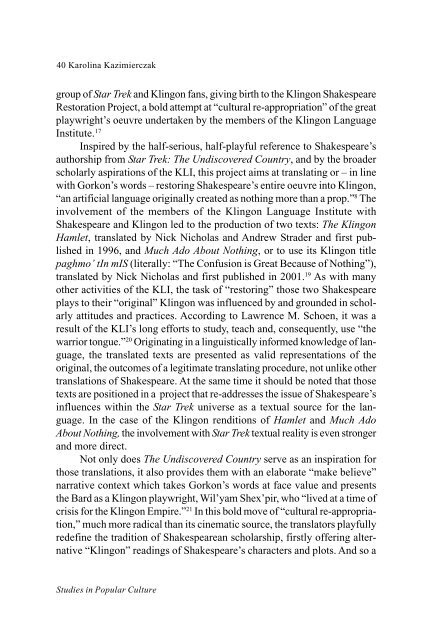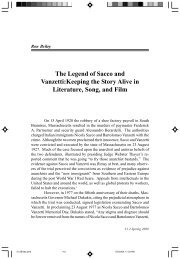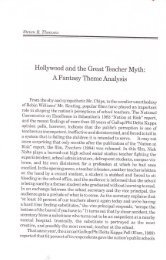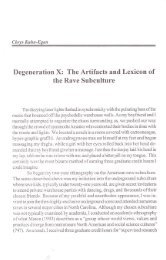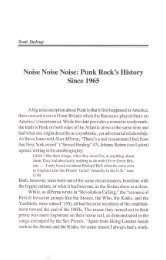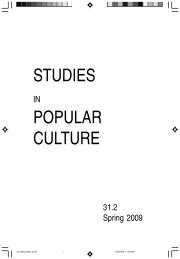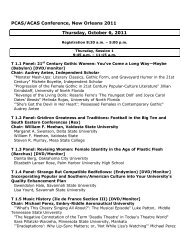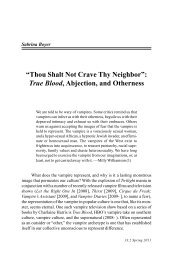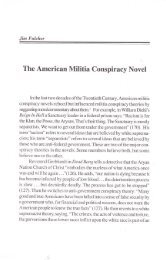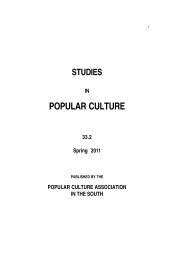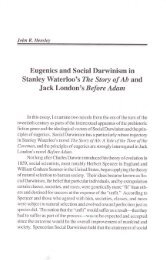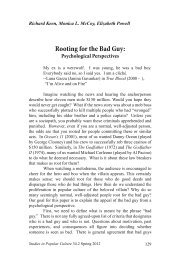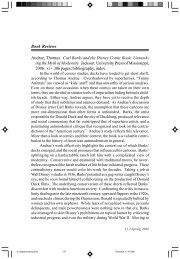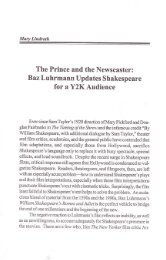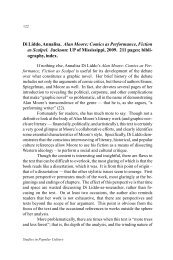Adapting Shakespeare for Star Trek and Star Trek for Shakespeare ...
Adapting Shakespeare for Star Trek and Star Trek for Shakespeare ...
Adapting Shakespeare for Star Trek and Star Trek for Shakespeare ...
You also want an ePaper? Increase the reach of your titles
YUMPU automatically turns print PDFs into web optimized ePapers that Google loves.
40 Karolina Kazimierczak<br />
group of <strong>Star</strong> <strong>Trek</strong> <strong>and</strong> Klingon fans, giving birth to the Klingon <strong>Shakespeare</strong><br />
Restoration Project, a bold attempt at “cultural re-appropriation” of the great<br />
playwright’s oeuvre undertaken by the members of the Klingon Language<br />
Institute. 17<br />
Inspired by the half-serious, half-playful reference to <strong>Shakespeare</strong>’s<br />
authorship from <strong>Star</strong> <strong>Trek</strong>: The Undiscovered Country, <strong>and</strong> by the broader<br />
scholarly aspirations of the KLI, this project aims at translating or – in line<br />
with Gorkon’s words – restoring <strong>Shakespeare</strong>’s entire oeuvre into Klingon,<br />
“an artificial language originally created as nothing more than a prop.” 8 The<br />
involvement of the members of the Klingon Language Institute with<br />
<strong>Shakespeare</strong> <strong>and</strong> Klingon led to the production of two texts: The Klingon<br />
Hamlet, translated by Nick Nicholas <strong>and</strong> Andrew Strader <strong>and</strong> first published<br />
in 1996, <strong>and</strong> Much Ado About Nothing, or to use its Klingon title<br />
paghmo’ tIn mIS (literally: “The Confusion is Great Because of Nothing”),<br />
translated by Nick Nicholas <strong>and</strong> first published in 2001. 19 As with many<br />
other activities of the KLI, the task of “restoring” those two <strong>Shakespeare</strong><br />
plays to their “original” Klingon was influenced by <strong>and</strong> grounded in scholarly<br />
attitudes <strong>and</strong> practices. According to Lawrence M. Schoen, it was a<br />
result of the KLI’s long ef<strong>for</strong>ts to study, teach <strong>and</strong>, consequently, use “the<br />
warrior tongue.” 20 Originating in a linguistically in<strong>for</strong>med knowledge of language,<br />
the translated texts are presented as valid representations of the<br />
original, the outcomes of a legitimate translating procedure, not unlike other<br />
translations of <strong>Shakespeare</strong>. At the same time it should be noted that those<br />
texts are positioned in a project that re-addresses the issue of <strong>Shakespeare</strong>’s<br />
influences within the <strong>Star</strong> <strong>Trek</strong> universe as a textual source <strong>for</strong> the language.<br />
In the case of the Klingon renditions of Hamlet <strong>and</strong> Much Ado<br />
About Nothing, the involvement with <strong>Star</strong> <strong>Trek</strong> textual reality is even stronger<br />
<strong>and</strong> more direct.<br />
Not only does The Undiscovered Country serve as an inspiration <strong>for</strong><br />
those translations, it also provides them with an elaborate “make believe”<br />
narrative context which takes Gorkon’s words at face value <strong>and</strong> presents<br />
the Bard as a Klingon playwright, Wil’yam Shex’pir, who “lived at a time of<br />
crisis <strong>for</strong> the Klingon Empire.” 21 In this bold move of “cultural re-appropriation,”<br />
much more radical than its cinematic source, the translators playfully<br />
redefine the tradition of <strong>Shakespeare</strong>an scholarship, firstly offering alternative<br />
“Klingon” readings of <strong>Shakespeare</strong>’s characters <strong>and</strong> plots. And so a<br />
Studies in Popular Culture


